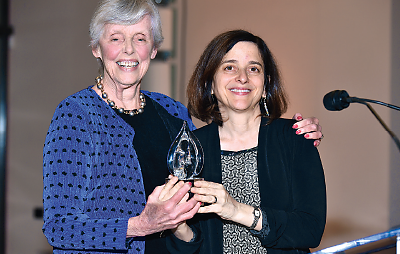Lisa Dixon, M.D., M.P.H., a professor of psychiatry at Columbia University Medical Center, has embraced the mantra of partnership throughout her career in the field of health services. And through these relationships, she has been able to improve the quality of care for countless people with psychiatric disorders, while engaging these people and their families to also become an active part of the process.
On November 13, one of Dixon’s many partners, the National Alliance on Mental Illness (NAMI), recognized her research and commitment to enacting meaningful changes in psychiatric care by presenting her with the 2014 NAMI Scientific Research Award.
“NAMI was privileged to honor Dr. Dixon with this year’s award,” said NAMI Executive Director Mary Giliberti. “She is someone whose research is truly making a difference. Her work exemplifies the foundation of NAMI’s mission—research to build better lives for the nearly 60 million Americans affected by mental illness every year.”
“She is helping to change mental health care, challenging it to be proactive rather than reactive, and to include families as partners in recovery,” Giliberti continued. “We are proud to have her and other APA members as part of the NAMI movement.”
Dixon was both honored and humbled by the award, telling Psychiatric News, “NAMI means a lot to me personally; it plays an important role in mental health advocacy, research, education, and support of patients and families, and it’s been a privilege to work with NAMI for over 20 years on projects like the Family-to-Family program.”
Dixon, who also directs the Center for Practice Innovations at the New York State Psychiatric Institute, discussed the Family-to-Family program—an educational course for family and friends of people living with mental illness to provide them with support and equip them to be more effective advocates and caregivers—during her award lecture as an example of how collaboration can “connect service to science.”
“NAMI created this program that became widely disseminated but had no empirical evidence that it worked,” she said. “But my research group, then at the University of Maryland School of Medicine, teamed up with NAMI, and together we conducted a randomized study of the program to prove that it is effective, which can help it grow even more.”
Dixon also noted the RAISE (Recovery After an Initial Schizophrenia Episode) program as an example of partnerships transforming science into clinical service. A joint effort among federal agencies, the scientific community, health service providers, and health care consumers, RAISE aims to improve schizophrenia treatment through coordinated and aggressive care during the earliest stages of illness.
“The foundational work we did with RAISE helped set the stage for early-intervention programs recently implemented in New York and Maryland,” Dixon said. “We still have a lot of work to do to cover the rest of the country, but it’s a victory in connecting science to service. But the meta message is that whichever direction you take, whether service-to-science or science-to-service, you need to appreciate, advocate, and get involved in partnerships to carry out meaningful research.”
The NAMI Scientific Research Award is supported by the Peter Corbin Kohn Memorial Fund. ■

